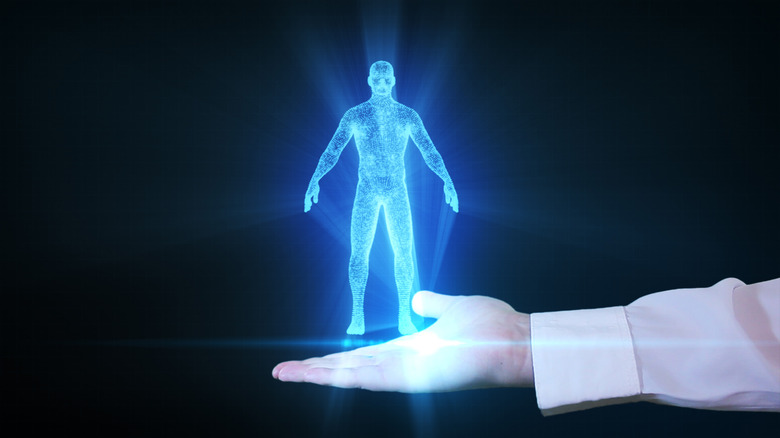This Is What Humans Might Evolve To Look Like In The Year 3000
The turn of the next millennium is still a long way off, but that hasn't stopped scientists from simulating what future human evolution might look like when the year 3000 hits. The result? A computer simulation called "Mindy" features some pretty interesting changes that scientists say humanity could face if the current trends in technology continue.
Suffice it to say that if the model is right, the future of humanity leaves much to be desired. Many have been concerned for years about how spending hours working at a desk, hunched over a keyboard, is going to affect humans in the long term. Well, if Mindy is anything to go by, it could lead to humans in the year 3000 having hunched backs and arched necks—and even suffering from something scientists are calling "tech neck," which causes the neck to sit slightly more forward and down as if hunched over.
Another possible issue the model highlights is a 90-degree elbow, which could be tied to your arms while always sitting on the arms of a chair, perhaps interacting with a mouse or keyboard. The simulations also predict that the future of human evolution will suffer from thicker skulls and smaller brains in the year 3000, another side effect of technology making us lazy and causing us to lose some of our brain capacity due to lack of usage.
Finally, two other possible issues the model highlights are what some are calling "text claw," which causes the hand to look as if it is holding a smartphone constantly, as well as a second eyelid—perhaps an evolutionary trait that might come into play to help protect our eyes from dangerous blue light emitted by computer monitors.
Of course, these predictions about the future of human evolution are just that: predictions. And they aren't based on any deep scientific information. In fact, the model first surfaced back in 2022 and was commissioned by TollFreeForwarding to warn folks about using technology too much. But if using tools for thousands of years hasn't changed how our hands are shaped, then the way we use smartphones and computers likely isn't going to change that either.
Further, it's almost impossible for any of us to properly predict what human evolution will entail. Evolution is a very tricky business, and there's no real way for us to control it or force our bodies to evolve in specific ways. It's highly likely that the future of human evolution will see changes in more longstanding human traits such as eye color, hair color, and skin color.
